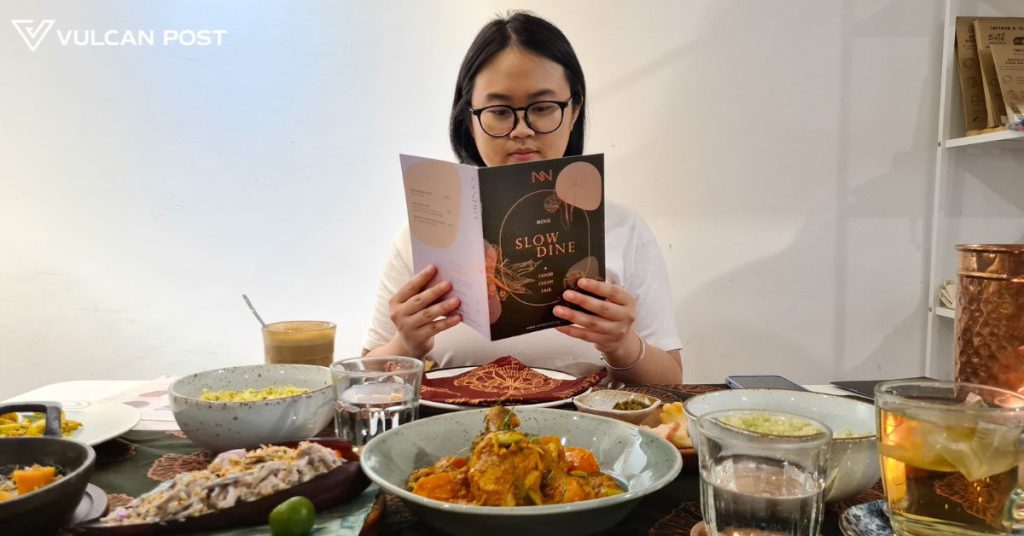While eating, do you think about everything that made that dish possible?
Honestly, I don’t. I might think of the chef, especially if it’s cooked by myself or someone I know. But rarely do I think about who grew the produce I ate, who made the plate my food is served on, or who came up with the original recipe for the dish.
This lack of understanding seems to be something that the slow food movement tries to address.
At least, it seemed that way when I received an invitation from UNPLUG to its pop-up dining event, Slow Dine. UNPLUG is a sustainable retail and ecommerce startup based in Bangsar.

“Inspired by provenance and sustainability, the Slow Dine features heritage recipes and aims to draw your attention to the entire local value chain from farm to table,” the invitation explained.
With the promise of homegrown produce and a Malay heritage menu, I sent in my RSVP, bringing along my managing editor, Sade, on what we hoped would be a delightful gastronomical journey.
A tablescape to remember
Showing up at Fittie Sense Cafe in Bangsar on a rainy Saturday evening, we were greeted and seated by Najmia Zulkarnian, the co-founder of UNPLUG.
The tablescape immediately captured my attention. Dressed in a forest green tablecloth with coral-toned detailing, the table was set with beautiful wares, most notably the copper jug and coaster.

From a pamphlet, we learnt that the copper jugs and coasters are from Meraki Copper, a homegrown brand selling copper homeware handmade in India.
The tablecloth and napkins were handmade traditional handblocked batik fabrics from Nysakapas.
Next to our table, there were shelves displaying products found on our tablescape that were for sale. Here, we spotted some familiar products such as beeswax wraps from Saffron & Serai, skincare products from Herbbies, and candles from Mangosteen.

Other brands include Muni, a Sepang-based brand selling honest clothes using tropical plant dyes, and Tanoti Craft, a boutique songket atelier with products made by master weavers and designers in Sarawak. Meraki Copper and Nysakapas products were also displayed for sale.

Guests can also shop the tablescape by scanning a QR code found on a small card on the table.

While knowing where the tableware came from might not sound like a big deal to some, I felt a sense of connection and pride knowing that these items were from homegrown brands.
Knowing exactly where your food came from
Graciously, Najmia had ordered all the dishes on the menu for Sade and me to try out. Some arrived on wooden dish trays from Dapo, a timberware brand by The Green Factory.

More than just displaying the products on the shelves, it was good to see them actually being integrated into the dining experience, which would naturally increase their visibility to consumers.
The pop-up’s bestseller, the Kerabu Jantung Pisang, came wrapped in a banana leaf on top of a Saffron & Serai beeswax wrap on the Dapo wooden tray.

Something I adored about the menu was the explanations of each food, which not only told me the flavours to expect, but often also mentioned where the ingredients or recipes are sourced from.
For instance, knowing that the Kerabu Jantung Pisang is a Kelantanese-style dish reminded me of my travels back to my father’s hometown of Kota Bharu—I had indeed noticed that it shared similar flavours to the Kelantanese dish, Laksam.
The ingredients are also very localised. For instance, the squid was from Pulau Ketam, while the fish was from Sungai Pahang.
Selected dishes from the event were concocted in collaboration with GK Organic Farm from Bangi which exclusively uses self-made compost when growing its produce.

The rice dishes were made using rice from Langit, a local social enterprise that promotes heirloom agriculture produce by smallholder farmers from East Malaysia.
Aesthetic quality and grounded stories aside though, the food served at Slow Dine was actually delicious too. Malay food isn’t something I gravitate to often, so this dinner gave me some insight into what I’m missing out on.

Keeping the heritage alive
While there were many delicious dishes, it was knowing where the food came from—both culturally and literally—that truly made the whole experience so memorable.
Will this actually change the way we dine though? Probably not anytime soon, as many of us are still most concerned about the cost of what we eat.
It will take a lot more time before we as a community can learn to properly appreciate the slow food movement, but this also points to its potential as a business model.
Najmia shared that the event we went to was the fourth edition of Slow Dine. The response they’ve received so far has given them the confidence to do yet another iteration down the road.
But this is all part of a bigger picture, as these Slow Dine pop-ups are actually a form of market validation for a more permanent dining experience in the future.
To join future Slow Dine events, you can keep an eye out for announcements on their social media here.











